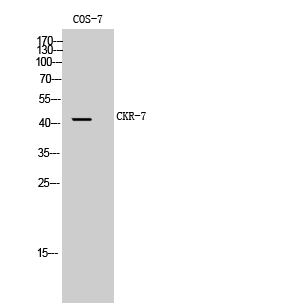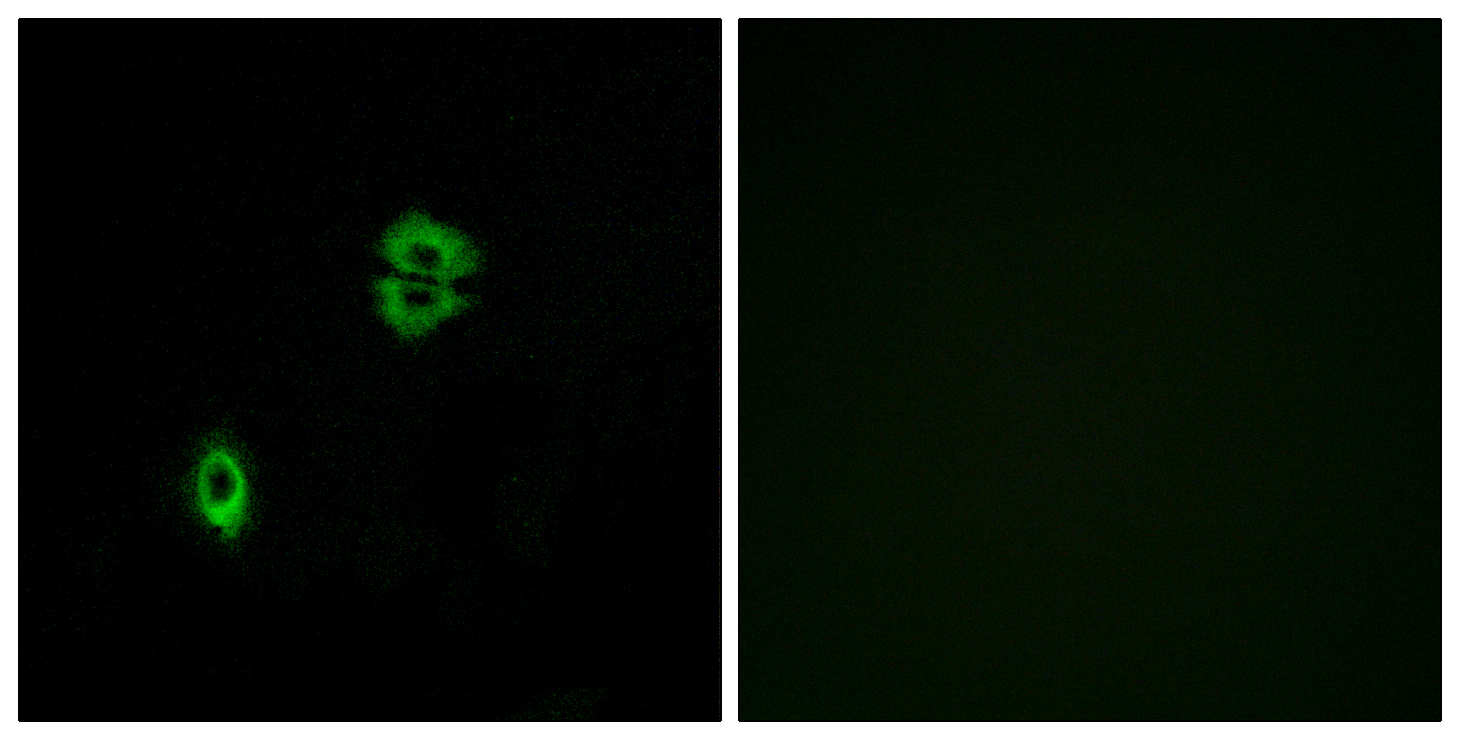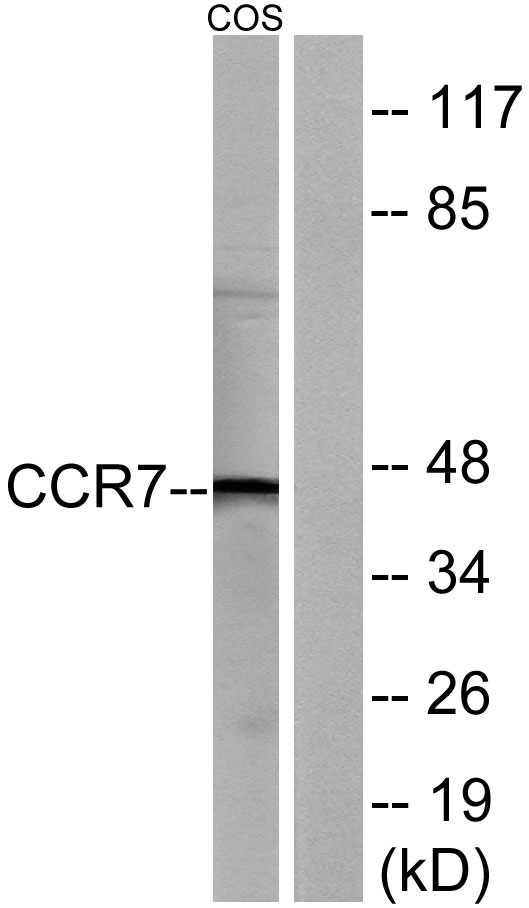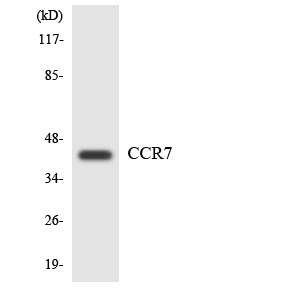CKR-7 Polyclonal Antibody
- Catalog No.:YT0938
- Applications:WB;IF;ELISA
- Reactivity:Human;Monkey
- Target:
- CKR-7
- Fields:
- >>Cytokine-cytokine receptor interaction;>>Viral protein interaction with cytokine and cytokine receptor;>>Chemokine signaling pathway
- Gene Name:
- CCR7
- Protein Name:
- C-C chemokine receptor type 7
- Human Gene Id:
- 1236
- Human Swiss Prot No:
- P32248
- Mouse Swiss Prot No:
- P47774
- Immunogen:
- The antiserum was produced against synthesized peptide derived from human CCR7. AA range:170-219
- Specificity:
- CKR-7 Polyclonal Antibody detects endogenous levels of CKR-7 protein.
- Formulation:
- Liquid in PBS containing 50% glycerol, 0.5% BSA and 0.02% sodium azide.
- Source:
- Polyclonal, Rabbit,IgG
- Dilution:
- WB 1:500 - 1:2000. IF 1:200 - 1:1000. ELISA: 1:40000. Not yet tested in other applications.
- Purification:
- The antibody was affinity-purified from rabbit antiserum by affinity-chromatography using epitope-specific immunogen.
- Concentration:
- 1 mg/ml
- Storage Stability:
- -15°C to -25°C/1 year(Do not lower than -25°C)
- Other Name:
- CCR7;CMKBR7;EBI1;EVI1;C-C chemokine receptor type 7;C-C CKR-7;CC-CKR-7;CCR-7;BLR2;CDw197;Epstein-Barr virus-induced G-protein coupled receptor 1;EBI1;EBV-induced G-protein coupled receptor 1;MIP-3 beta receptor;CD antigen CD19
- Observed Band(KD):
- 43kD
- Background:
- The protein encoded by this gene is a member of the G protein-coupled receptor family. This receptor was identified as a gene induced by the Epstein-Barr virus (EBV), and is thought to be a mediator of EBV effects on B lymphocytes. This receptor is expressed in various lymphoid tissues and activates B and T lymphocytes. It has been shown to control the migration of memory T cells to inflamed tissues, as well as stimulate dendritic cell maturation. The chemokine (C-C motif) ligand 19 (CCL19/ECL) has been reported to be a specific ligand of this receptor. Signals mediated by this receptor regulate T cell homeostasis in lymph nodes, and may also function in the activation and polarization of T cells, and in chronic inflammation pathogenesis. Alternative splicing of this gene results in multiple transcript variants. [provided by RefSeq, Sep 2014],
- Function:
- function:Receptor for the MIP-3-beta chemokine. Probable mediator of EBV effects on B-lymphocytes or of normal lymphocyte functions.,induction:By EBV.,online information:CC chemokine receptors entry,similarity:Belongs to the G-protein coupled receptor 1 family.,tissue specificity:Expressed in various lymphoid tissues and activated B- and T-lymphocytes, strongly up-regulated in B-cells infected with Epstein-Barr virus and T-cells infected with herpesvirus 6 or 7.,
- Subcellular Location:
- Cell membrane; Multi-pass membrane protein.
- Expression:
- Expressed in various lymphoid tissues and activated B- and T-lymphocytes, strongly up-regulated in B-cells infected with Epstein-Barr virus and T-cells infected with herpesvirus 6 or 7.
- June 19-2018
- WESTERN IMMUNOBLOTTING PROTOCOL
- June 19-2018
- IMMUNOHISTOCHEMISTRY-PARAFFIN PROTOCOL
- June 19-2018
- IMMUNOFLUORESCENCE PROTOCOL
- September 08-2020
- FLOW-CYTOMEYRT-PROTOCOL
- May 20-2022
- Cell-Based ELISA│解您多样本WB检测之困扰
- July 13-2018
- CELL-BASED-ELISA-PROTOCOL-FOR-ACETYL-PROTEIN
- July 13-2018
- CELL-BASED-ELISA-PROTOCOL-FOR-PHOSPHO-PROTEIN
- July 13-2018
- Antibody-FAQs
- Products Images

- Western Blot analysis of COS-7 cells using CKR-7 Polyclonal Antibody

- Immunofluorescence analysis of A549 cells, using CCR7 Antibody. The picture on the right is blocked with the synthesized peptide.

- Western blot analysis of lysates from COS7 cells, using CCR7 Antibody. The lane on the right is blocked with the synthesized peptide.

- Western blot analysis of the lysates from HeLa cells using CCR7 antibody.



